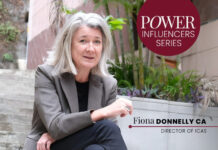Len Prazych talks about his recent book, the writing of which was motivated partly by his own personal quest for healing. Here, he discusses the inspiration behind the book, the challenges of writing about trauma, and the book’s part in the healing process.
Your book, My Fathers: Letters of Healing on a Quest for the Truth, is an incredibly personal memoir. What inspired you to write this book and share your story with the public?
The inspiration to write the book was born out of the emotional pain of holding on to a dark family secret for nearly half a century! I’ve studied the power of writing to heal and thought that writing the book, while grieving my recently deceased father, was a healthy and therapeutic way to do this. I was correct!
I was also inspired to help others who may have been the victims of sexual abuse (by Catholic priests and anyone else) in suggesting how telling their story and sharing their pain, no matter how long it’s been since the abuse took place – it may still be happening – will help with their emotional and spiritual healing. It may also help to see justice be served, the abusers be identified and, in some cases, receive damages through the courts via civil or criminal charges.
Finally, I want my story to be a reminder to everyone that “if you see something, say something”. I want parents to talk to their children, to tell them the truth about abuse, not shield them from it or sweep it under the rug as “something we don’t talk about in our family”.
The process of writing about trauma can be both cathartic and painful. Were there particular moments or chapters that were especially difficult to write, and how did you overcome those challenges?
The moments and chapters that were more difficult to write were the ones during which I continued to process and understand the heavier events, for example, realising that my biological father experienced the trauma as a 12-year-old (about the same age I was when I experienced my trauma) of finding his father hanging from a rafter in the basement after his suicide. I had to take a break in my writing, usually for a couple of days before picking up again. Or, in my attempt to avoid the “hard stuff”, I would move on to another, less delicate part of the book. Ultimately, I knew I just had to keep on writing.
How did your perception of your biological father and the priest change over the course of writing this memoir? Did you discover anything unexpected about them or yourself?
Like my grandfather’s suicide and other events of my biological father’s life that shaped him into become the father he was (or wasn’t) to me, I found myself releasing some of my anger and becoming more compassionate and feeling sorry for him. This led to my understanding him more, as well as how and why my incident happened. The subsequent gaslighting and silence inflicted more pain and anger, but time and understanding help me to somewhat forgive but certainly not forget.
Before I wrote my book, I’ve studied paedophile priests, Catholic and otherwise, to understand their motivations and behaviours. As criminal and contemptible as my priest and others like him were, I realised that I am more upset at the institution – the Catholic Church – at being complicit in allowing the abuse of thousands of other boys to continue, sometimes over decades, by moving priests from place to place, “scrubbing” their evil pasts, protecting their privacy and protecting their own.
My Fathers deals with heavy themes of love, betrayal, and forgiveness. What message do you hope readers take away regarding these themes?
That when you love, you risk the pain of losing that love and suffering, which is all part of the human experience. Understanding that even those we place on the highest pedestals – parents and priests, for example – can hurt and disappoint us in very profound ways. And, yes, forgiveness is hard, if not impossible for some, but the sooner you can try to overcome the trauma of betrayal and move on with your life, the sooner you’ll be able to try to allow yourself to love – and be loved – again.
Healing and understanding are central themes in your book. Can you share some specific ways in which you found healing and what advice you would give to others on a similar journey?
My healing journey was enhanced by compassion, which allowed me to lose enough anger to allow understanding to creep in. The act of journalling and writing about it all, which ultimately resulted in my writing my memoir, combined with professional psychotherapy, were critical parts of my journey, as were having a supportive spouse and a core group of friends willing to provide a sympathetic ear. When I no longer wanted to unburden my “stuff” on my spouse and friends because there is only so much they can be expected to bear, a support group of other abuse victims was helpful. My final advice is to be patient; healing is not a linear process, and everyone grieves and heals in different ways. It takes time and work. You need to trust that if you put in the time and do the work, whatever that may be (maybe writing a book!), you will find healing.
Since the publication of your book, have you received any feedback from readers who have had similar experiences? How has their response impacted you and your view of your memoir?
Yes, I’ve gotten feedback from readers who have had similar experiences and I’ve been applauded for my courage in writing the book and putting such a sensitive topic out there for public consumption, acknowledging my pain and anger and always, always looking for the truth.
After others have said, “I’m so sorry you had to deal with this, I never knew,” some immediately shared their own memories, tales of betrayal, parental conflicts, or past trauma. Not only do I welcome these comments, but I’m also encouraging them. These are the memories that need to be shared, the stories that need to be told, the conversations that need to be had, and sometimes, the pain that has to be released, along with a measure of forgiveness.
My initial apprehensions about writing the book and the negative reception it might receive from those who have too much of their emotional lives invested in keeping dark family messages and secrets intact were quickly dispelled by comments of others who shared their encouragement, support and, sometimes, inspiration to share their own secret, write their own letter (or book), which I’m offering them the help to do.
It’s only been six months since I launched the book, but I’m confident I made the right decision to do so. I’m seeing regularly (with interviews and publicity like this!) the potential of it to do more to help others suffering with whatever pain they’re in to find some level of healing by writing and talking about it.
Executive Profile

Len Prazych has been a professional writer for most of his adult life. He received his master’s degree in The Psychology of Narrative, during which he researched and experienced the remarkable power of writing to heal physically and emotionally, which helped him through the experience he had when he was 11, which he shares in My Fathers: Letters of Healing on a Quest for the Truth, his first book. Born and raised in New Jersey, he now lives in upstate New York, USA.
- Visit https://lenprazych.com/ or https://www.facebook.com/LenPrazych.Author or Instagram (@lenprazych).
- Amazon link: https://www.amazon.com/My-Fathers-Letters-Healing-Quest/dp/B0CJSVTH1Z/




































































